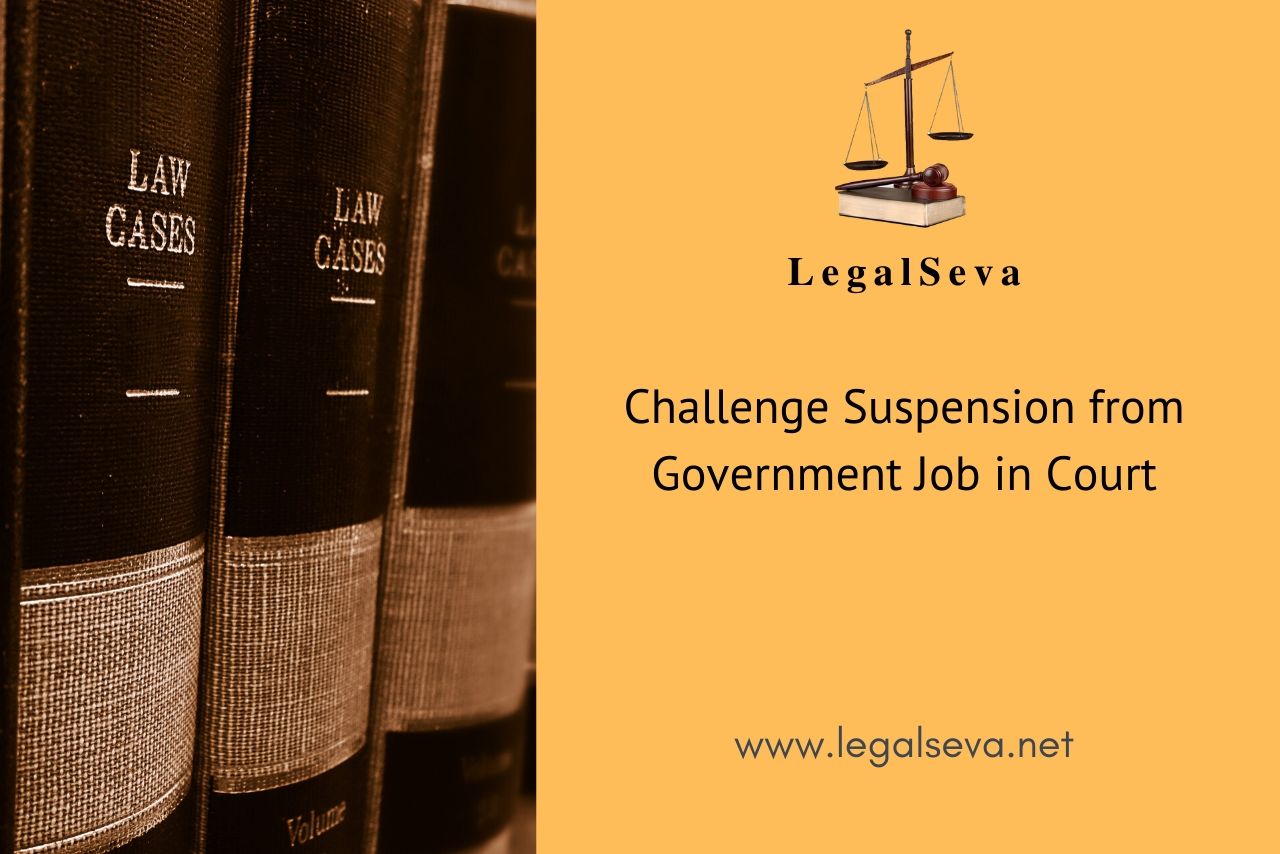Last Updated on June 20, 2024 by Satish Mishra
Suspension from government job is different from getting fired from a private job. Suspension can be defined as temporary withdrawal of duties from a government servant, pending inquiry into his conduct, with simultaneous reduction in pay and withdrawal of some rights and privileges. The related rules are laid down in The Central Civil Services (Classification, Control and Appeal) Rules, 1965.
Also Read- SENIORITY GRANTED FROM THE BACK DATE BY CAT CHANDIGARH
REASON FOR SUSPENSION
The reason for suspension may be:-
- Any offence or conduct involving moral turpitude.
- Corruption, embezzlement or misappropriation of Government money, possession of disproportionate assets, misuse of official powers for personal gain.
- Serious negligence and dereliction of duty resulting in considerable loss to Government.
- Desertion of duty can be one of the reason for suspension.
- A government servant can be suspended because of refusal or deliberate failure to carry out written orders of superior officers.
- Reasons for Suspension, if not indicated in the suspension order itself, should be communicated within three months.
Also Read- DISCIPLINARY PROCEEDINGS PROCEDURE IN INDIA
CONDITION FOR SUSPENSION
A government servant can be suspended under following circumstances:-
- Where a disciplinary proceeding against him is contemplated or is pending.
- Where in the opinion of the competent authority, he has engaged himself in activities prejudicial to the interest of the security of the state.
- Where a case against him in respect of any criminal offence is under investigation, inquiry or trial.
Also Read- SUSPENSION ORDER CHALLENGED IN HIGH COURT CHANDIGARH
There are certain conditions for suspension intended only for guidance and should not be taken as mandatory:-
- Cases where continuance in office of the government servant will prejudice the investigation, trial or any inquiry.
- Cases where the continuance in office of the government servant is likely to seriously subvert discipline in the office.
- Cases where the continuance in office of the government servant will be against the wider public interest.
- Cases where allegations have been made against the government servant and preliminary inquiry would justify his prosecution and where the proceedings are likely to end in his conviction or dismissal, removal or compulsory retirement from service.
Also Read- SHOW CAUSE NOTICE BY EMPLOYER
RIGHTS OF SUSPENDED GOVERNMENT SERVANT
There are certain rights and privileges which a suspended government employee enjoys:-
- A suspended government employee will be entitled for 50% of his actual salary throughout his suspension period.
- He will be allowed to represent his side of case in front of Investigation Committee.
- His suspension can be revoked and he can re-start his job.
- He will get all the balance payment (50% salary during suspension) along with all other increments,that may have implemented by government during his suspension period, once he is proven innocent.
- If the decision of investigation Committee is not in the favor of suspended employee, he is always free to approach any civil/labor court, asking for a fare decision.
- Most of the suspensions are time bound. If the employee choose to remain silent, he can resume his services after completion of suspension period.
Also Read- Latest update on Service Laws
AUTHORITY COMPETENT TO SUSPEND
The appointing authority or any authority to which it is subordinate or the disciplinary authority. Any other authority empowered by the President, by general or special order, may place a Government servant under suspension. As per Rule 10(1) of CCS(CCA) Rules,1965 , it is provided that, except in case of an order of suspension made by the Comptroller and Auditor – General in regard to a member of the Indian Audit and Accounts Service and in regard to an Assistant Accountant General or equivalent (other than a regular member of the Indian Audit and Accounts Service), where the order of suspension is made by an authority lower than the appointing authority, such authority shall forthwith report to the appointing authority the circumstances in which the order was made.
Also Read- CENTRAL ADMINISTRATIVE TRIBUNAL (CAT) CHANDIGARH
DEEMED SUSPENSION
As per Rule 10 (2) of the CCS (CCA) Rules, 1965, a government servant shall be deemed to have been placed under suspension by an order of appointing authority –
(a) with effect from the date of his detention, if he is detained in custody, whether on a criminal charge or otherwise, for a period exceeding forty-eight hours;
(b) with effect from the date of his conviction, if, in the event of a conviction for an offence, he is sentenced to a term of imprisonment exceeding forty-eight hours and is not forthwith dismissed or removed or compulsorily retired consequent to such conviction.
- A question whether the order of suspension in a case covered under Rule 10 (2) of the CCS (CCA) Rules, 1965 has limited operation for the period of detention and not beyond it, was considered by the Supreme Court in the case of Union of India Vs. Rajiv Kumar (2003 (5) SCALE 297). Allowing the appeals of the Union of India in this case the Supreme Court has held that the order in terms of Rule 10 (2) is not restricted in its point of duration or efficacy to the actual period of detention only. It continues to be operative unless modified or revoked under Sub-Rule (5) (c) as provided in Sub-Rule 5 (a) of Rule 10 of the CCS (CCA) Rules, 1965.
Also Read- APPEAL AGAINST DISMISSAL IN CAT
RELATED CASE
A related case where Chief Electoral Officer(CEO) Punjab S Karuna Raju placed Moga Tehsildar Balwinder Singh under suspension for dereliction in duty. The CEO said Singh was not sending reports required by the election commission in time and was also found absent from duty. Serious negligence and dereliction of duty resulting in considerable loss to Government is the reason for such suspension.
This post is written by Dipti Prakash of Punjab University (2020 batch). For more info on subject, please dial 99888-17966.
